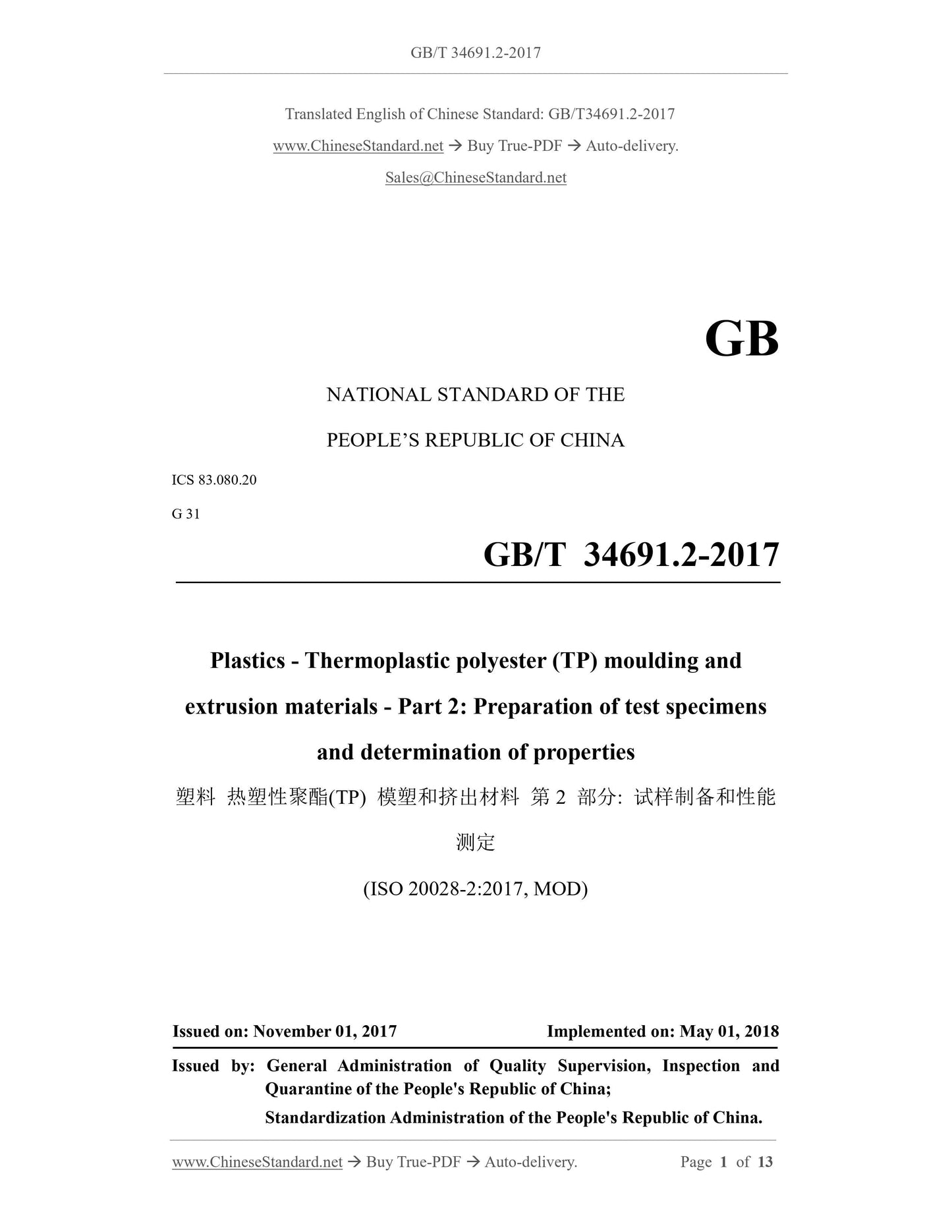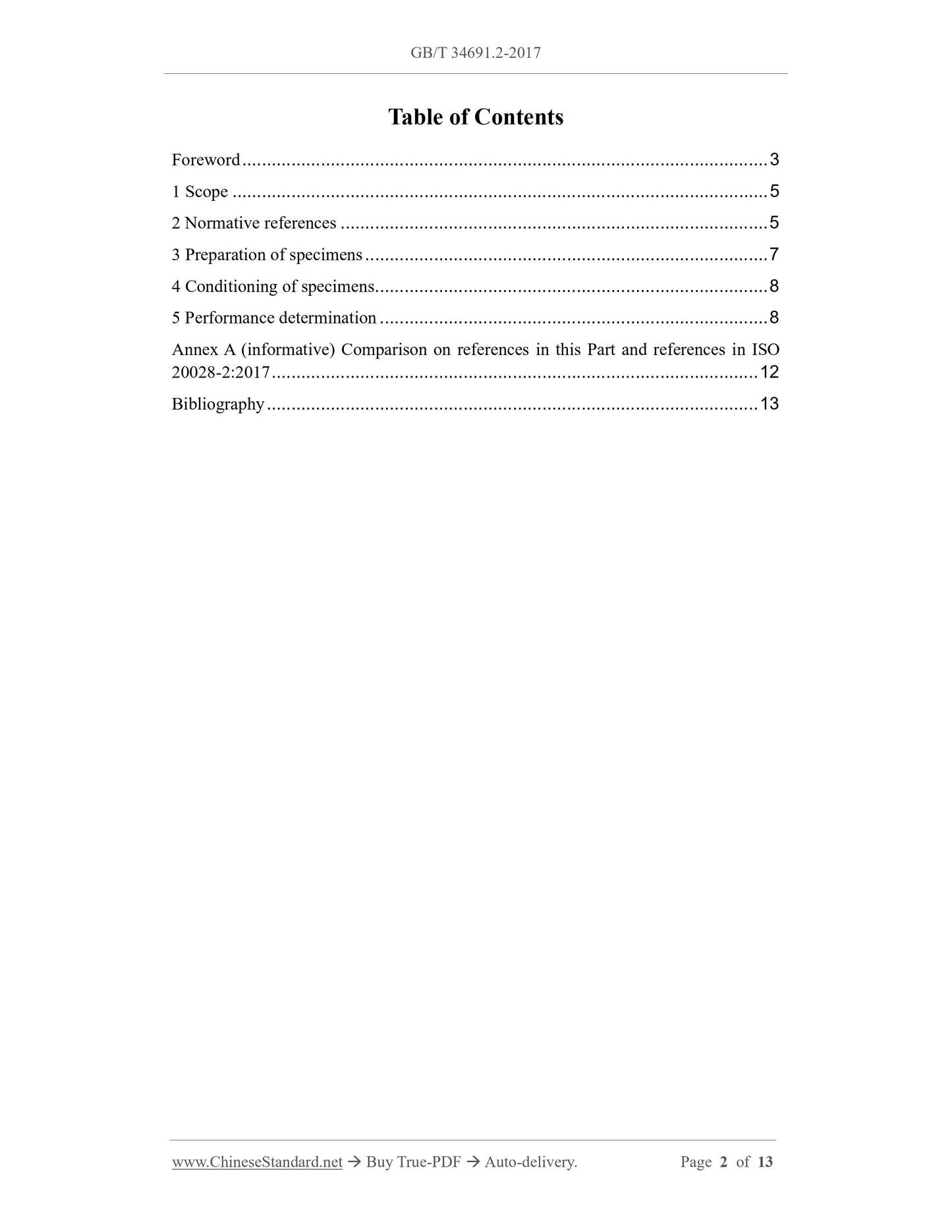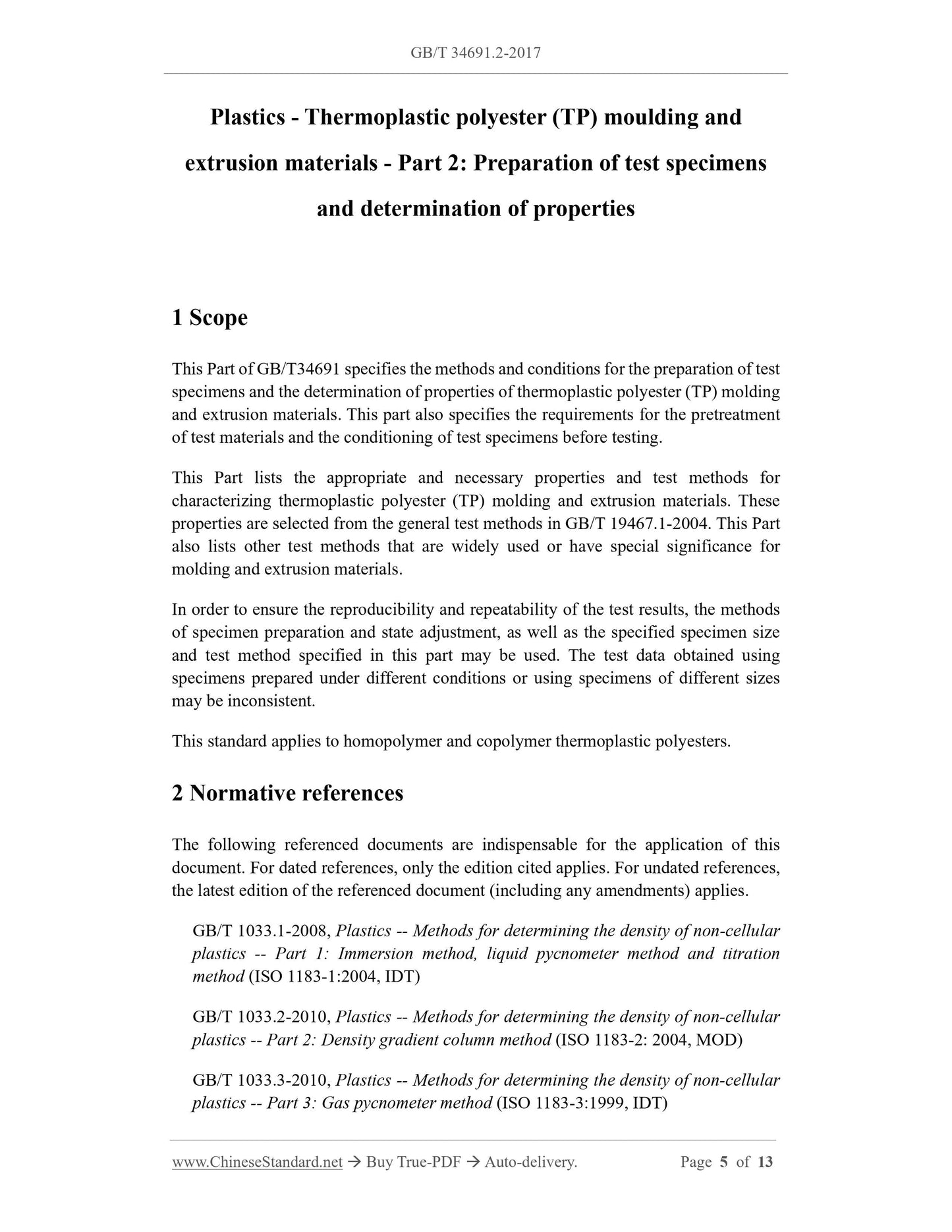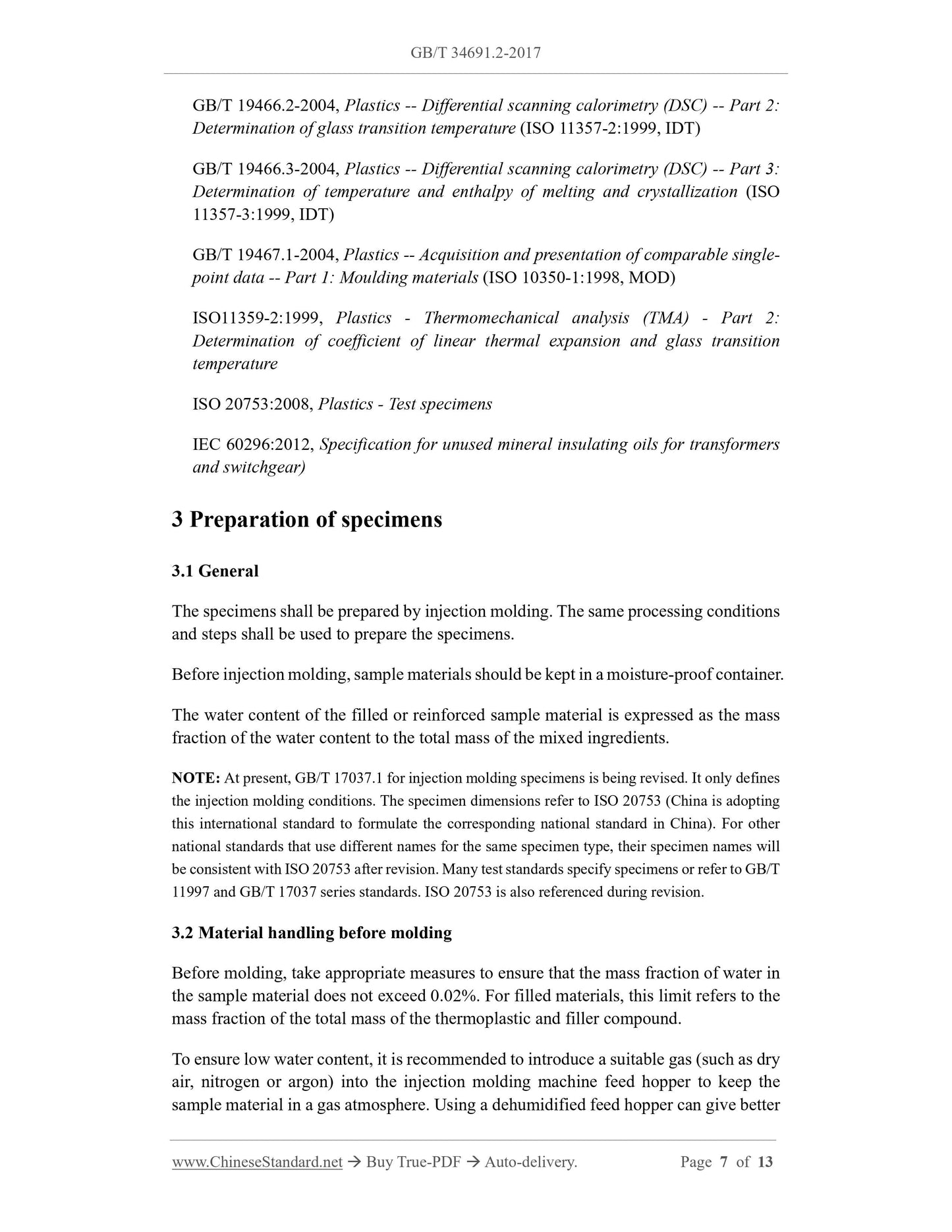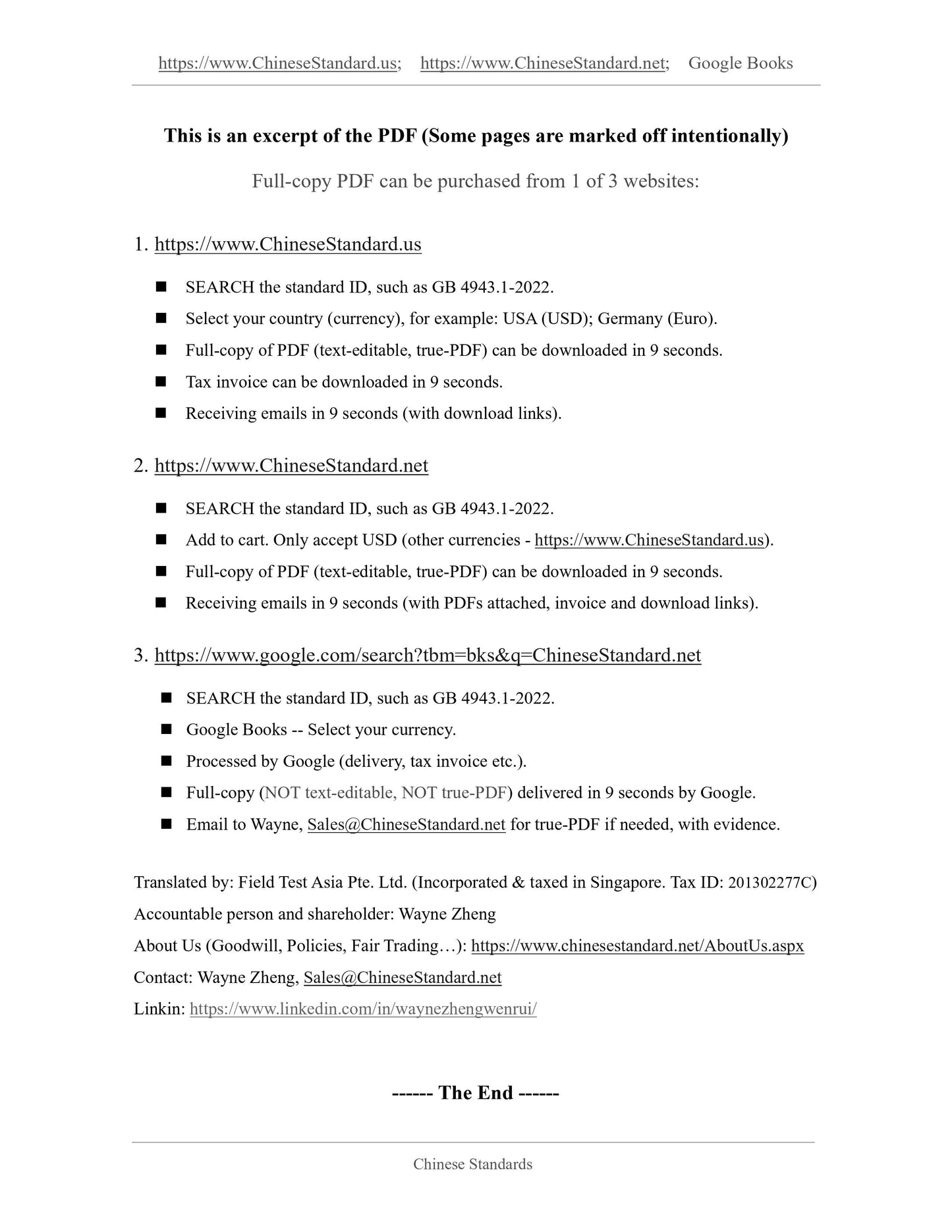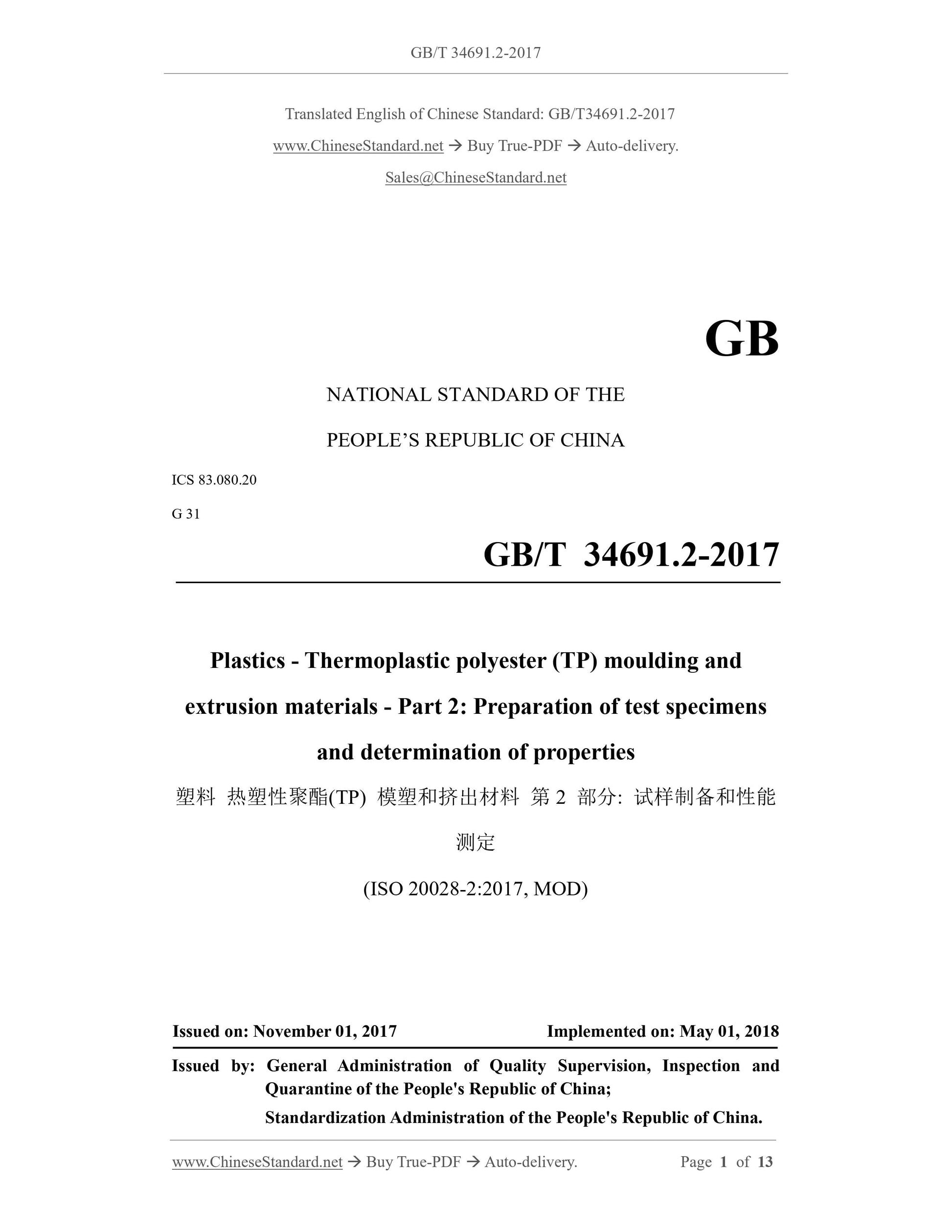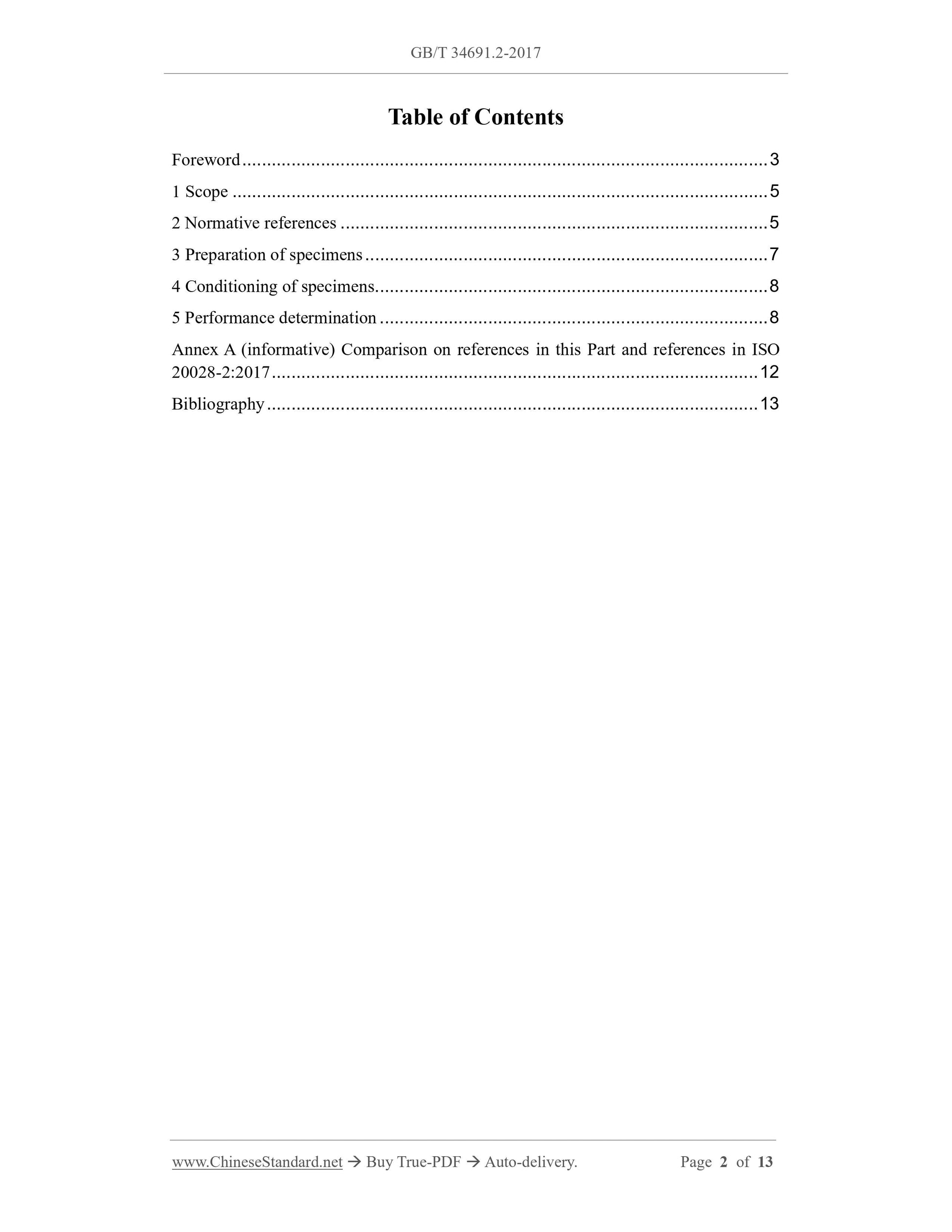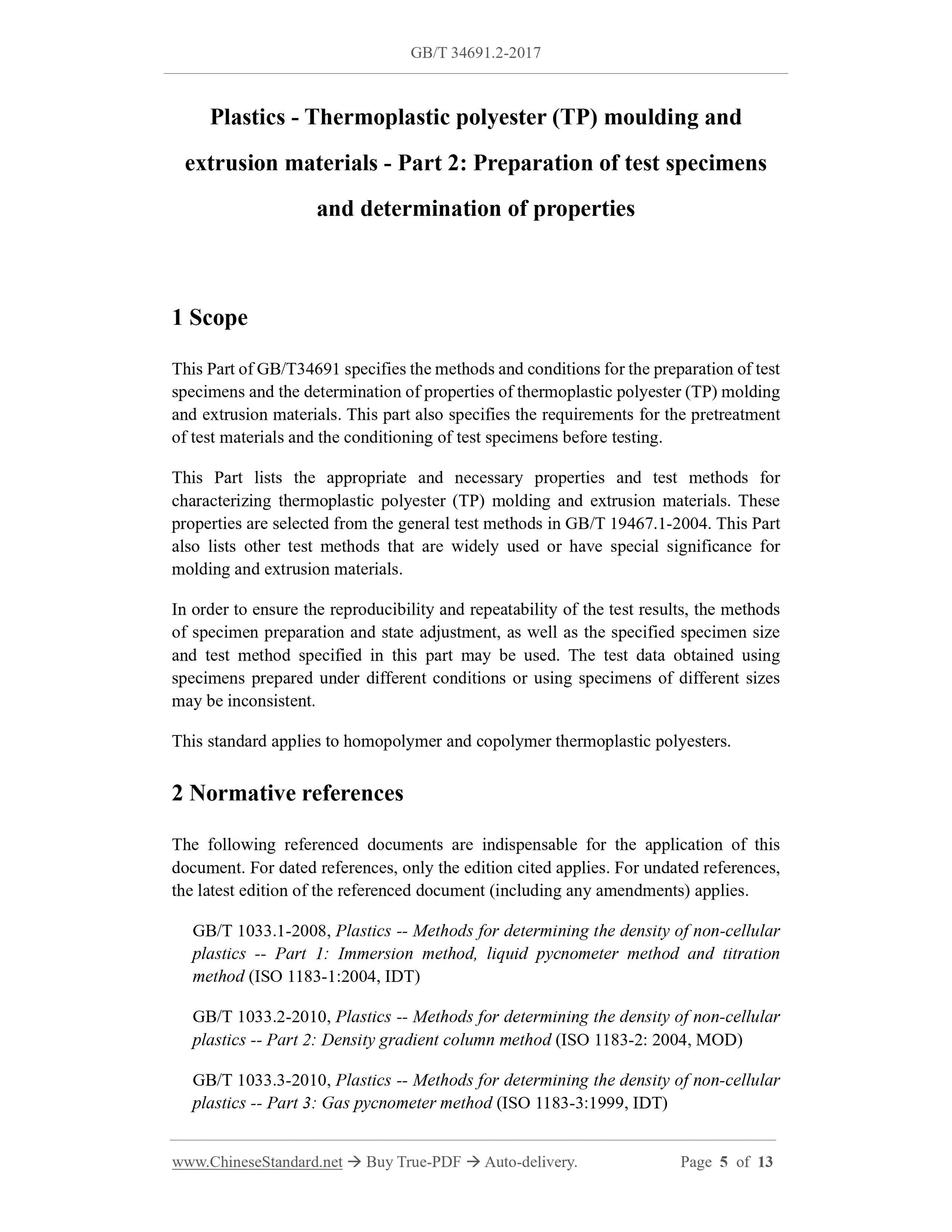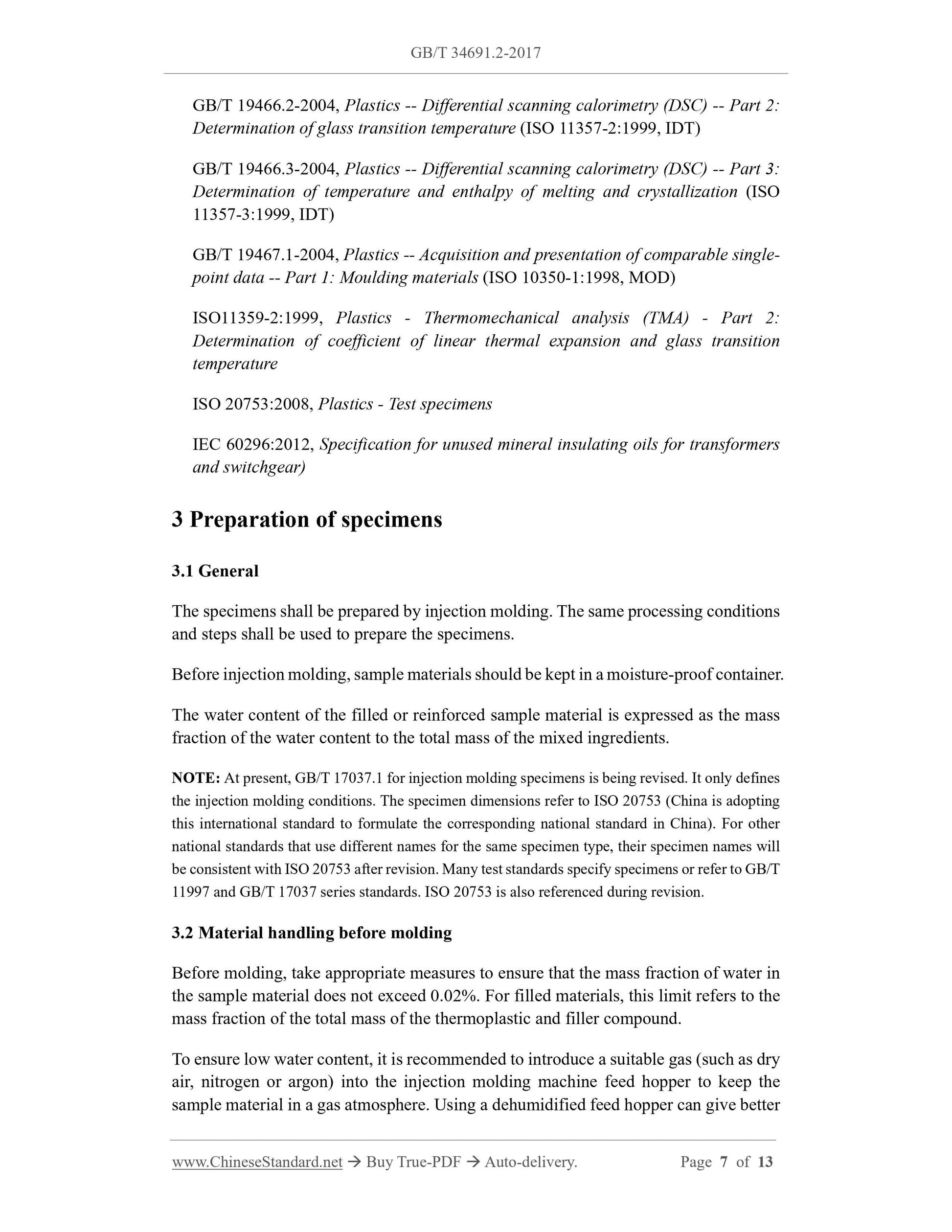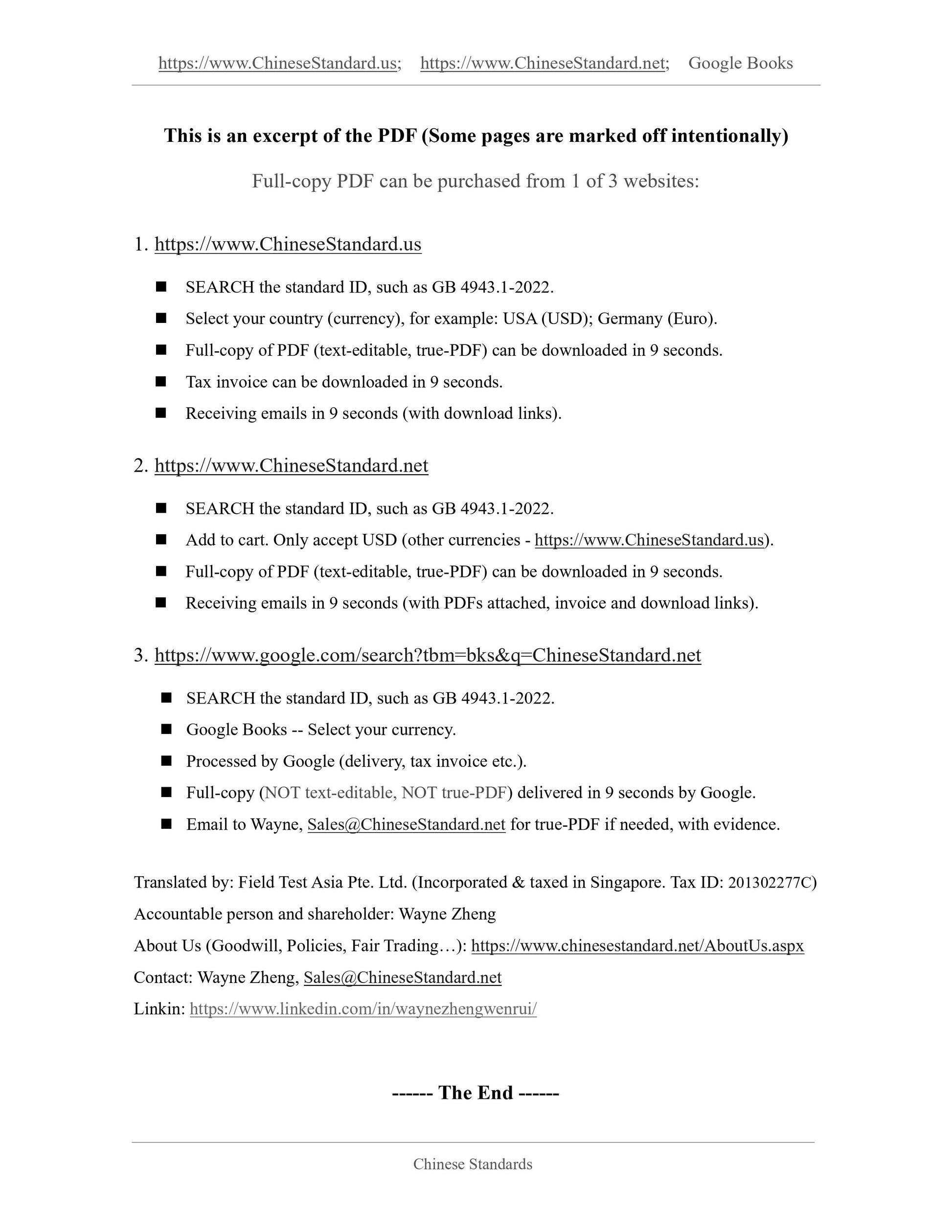1
/
of
5
PayPal, credit cards. Download editable-PDF and invoice in 1 second!
GB/T 34691.2-2017 English PDF (GBT34691.2-2017)
GB/T 34691.2-2017 English PDF (GBT34691.2-2017)
Regular price
$165.00 USD
Regular price
Sale price
$165.00 USD
Unit price
/
per
Shipping calculated at checkout.
Couldn't load pickup availability
Delivery: 3 seconds. Download true-PDF + Invoice.
Get QUOTATION in 1-minute: Click GB/T 34691.2-2017
Historical versions: GB/T 34691.2-2017
Preview True-PDF (Reload/Scroll if blank)
GB/T 34691.2-2017: Plastics -- Thermoplastic polyester (TP) moulding and extrusion materials -- Part 2: Preparation of test specimens and determination of properties
GB/T 34691.2-2017
GB
NATIONAL STANDARD OF THE
PEOPLE’S REPUBLIC OF CHINA
ICS 83.080.20
G 31
Plastics - Thermoplastic polyester (TP) moulding and
extrusion materials - Part 2: Preparation of test specimens
and determination of properties
(ISO 20028-2:2017, MOD)
ISSUED ON: NOVEMBER 01, 2017
IMPLEMENTED ON: MAY 01, 2018
Issued by: General Administration of Quality Supervision, Inspection and
Quarantine of the People's Republic of China;
Standardization Administration of the People's Republic of China.
Table of Contents
Foreword ... 3
1 Scope ... 5
2 Normative references ... 5
3 Preparation of specimens ... 7
4 Conditioning of specimens ... 8
5 Performance determination ... 8
Annex A (informative) Comparison on references in this Part and references in ISO
20028-2:2017 ... 12
Bibliography ... 13
Plastics - Thermoplastic polyester (TP) moulding and
extrusion materials - Part 2: Preparation of test specimens
and determination of properties
1 Scope
This Part of GB/T34691 specifies the methods and conditions for the preparation of test
specimens and the determination of properties of thermoplastic polyester (TP) molding
and extrusion materials. This part also specifies the requirements for the pretreatment
of test materials and the conditioning of test specimens before testing.
This Part lists the appropriate and necessary properties and test methods for
characterizing thermoplastic polyester (TP) molding and extrusion materials. These
properties are selected from the general test methods in GB/T 19467.1-2004. This Part
also lists other test methods that are widely used or have special significance for
molding and extrusion materials.
In order to ensure the reproducibility and repeatability of the test results, the methods
of specimen preparation and state adjustment, as well as the specified specimen size
and test method specified in this part may be used. The test data obtained using
specimens prepared under different conditions or using specimens of different sizes
may be inconsistent.
This standard applies to homopolymer and copolymer thermoplastic polyesters.
2 Normative references
The following referenced documents are indispensable for the application of this
document. For dated references, only the edition cited applies. For undated references,
the latest edition of the referenced document (including any amendments) applies.
GB/T 1033.1-2008, Plastics -- Methods for determining the density of non-cellular
plastics -- Part 1: Immersion method, liquid pycnometer method and titration
method (ISO 1183-1:2004, IDT)
GB/T 1033.2-2010, Plastics -- Methods for determining the density of non-cellular
plastics -- Part 2: Density gradient column method (ISO 1183-2: 2004, MOD)
GB/T 1033.3-2010, Plastics -- Methods for determining the density of non-cellular
plastics -- Part 3: Gas pycnometer method (ISO 1183-3:1999, IDT)
GB/T 19466.2-2004, Plastics -- Differential scanning calorimetry (DSC) -- Part 2:
Determination of glass transition temperature (ISO 11357-2:1999, IDT)
GB/T 19466.3-2004, Plastics -- Differential scanning calorimetry (DSC) -- Part 3:
Determination of temperature and enthalpy of melting and crystallization (ISO
11357-3:1999, IDT)
GB/T 19467.1-2004, Plastics -- Acquisition and presentation of comparable single-
point data -- Part 1: Moulding materials (ISO 10350-1:1998, MOD)
ISO11359-2:1999, Plastics - Thermomechanical analysis (TMA) - Part 2:
Determination of coefficient of linear thermal expansion and glass transition
temperature
ISO 20753:2008, Plastics - Test specimens
IEC 60296:2012, Specification for unused mineral insulating oils for transformers
and switchgear)
3 Preparation of specimens
3.1 General
The specimens shall be prepared by injection molding. The same processing conditions
and steps shall be used to prepare the specimens.
Before injection molding, sample materials should be kept in a moisture-proof container.
The water content of the filled or reinforced sample material is expressed as the mass
fraction of the water content to the total mass of the mixed ingredients.
NOTE: At present, GB/T 17037.1 for injection molding specimens is being revised. It only defines
the injection molding conditions. The specimen dimensions refer to ISO 20753 (China is adopting
this international standard to formulate the corresponding national standard in China). For other
national standards that use different names for the same specimen type, their specimen names will
be consistent with ISO 20753 after revision. Many test standards specify specimens or refer to GB/T
11997 and GB/T 17037 series standards. ISO 20753 is also referenced during revision.
3.2 Material handling before molding
Before molding, take appropriate measures to ensure that the mass fraction of water in
the sample material does not exceed 0.02%. For filled materials, this limit refers to the
mass fraction of the total mass of the thermoplastic and filler compound.
To ensure low water content, it is recommended to introduce a suitable gas (such as dry
air, nitrogen or argon) into the injection molding machine feed hopper to keep the
sample material in a gas atmosphere. Using a dehumidified feed hopper can give better
Get QUOTATION in 1-minute: Click GB/T 34691.2-2017
Historical versions: GB/T 34691.2-2017
Preview True-PDF (Reload/Scroll if blank)
GB/T 34691.2-2017: Plastics -- Thermoplastic polyester (TP) moulding and extrusion materials -- Part 2: Preparation of test specimens and determination of properties
GB/T 34691.2-2017
GB
NATIONAL STANDARD OF THE
PEOPLE’S REPUBLIC OF CHINA
ICS 83.080.20
G 31
Plastics - Thermoplastic polyester (TP) moulding and
extrusion materials - Part 2: Preparation of test specimens
and determination of properties
(ISO 20028-2:2017, MOD)
ISSUED ON: NOVEMBER 01, 2017
IMPLEMENTED ON: MAY 01, 2018
Issued by: General Administration of Quality Supervision, Inspection and
Quarantine of the People's Republic of China;
Standardization Administration of the People's Republic of China.
Table of Contents
Foreword ... 3
1 Scope ... 5
2 Normative references ... 5
3 Preparation of specimens ... 7
4 Conditioning of specimens ... 8
5 Performance determination ... 8
Annex A (informative) Comparison on references in this Part and references in ISO
20028-2:2017 ... 12
Bibliography ... 13
Plastics - Thermoplastic polyester (TP) moulding and
extrusion materials - Part 2: Preparation of test specimens
and determination of properties
1 Scope
This Part of GB/T34691 specifies the methods and conditions for the preparation of test
specimens and the determination of properties of thermoplastic polyester (TP) molding
and extrusion materials. This part also specifies the requirements for the pretreatment
of test materials and the conditioning of test specimens before testing.
This Part lists the appropriate and necessary properties and test methods for
characterizing thermoplastic polyester (TP) molding and extrusion materials. These
properties are selected from the general test methods in GB/T 19467.1-2004. This Part
also lists other test methods that are widely used or have special significance for
molding and extrusion materials.
In order to ensure the reproducibility and repeatability of the test results, the methods
of specimen preparation and state adjustment, as well as the specified specimen size
and test method specified in this part may be used. The test data obtained using
specimens prepared under different conditions or using specimens of different sizes
may be inconsistent.
This standard applies to homopolymer and copolymer thermoplastic polyesters.
2 Normative references
The following referenced documents are indispensable for the application of this
document. For dated references, only the edition cited applies. For undated references,
the latest edition of the referenced document (including any amendments) applies.
GB/T 1033.1-2008, Plastics -- Methods for determining the density of non-cellular
plastics -- Part 1: Immersion method, liquid pycnometer method and titration
method (ISO 1183-1:2004, IDT)
GB/T 1033.2-2010, Plastics -- Methods for determining the density of non-cellular
plastics -- Part 2: Density gradient column method (ISO 1183-2: 2004, MOD)
GB/T 1033.3-2010, Plastics -- Methods for determining the density of non-cellular
plastics -- Part 3: Gas pycnometer method (ISO 1183-3:1999, IDT)
GB/T 19466.2-2004, Plastics -- Differential scanning calorimetry (DSC) -- Part 2:
Determination of glass transition temperature (ISO 11357-2:1999, IDT)
GB/T 19466.3-2004, Plastics -- Differential scanning calorimetry (DSC) -- Part 3:
Determination of temperature and enthalpy of melting and crystallization (ISO
11357-3:1999, IDT)
GB/T 19467.1-2004, Plastics -- Acquisition and presentation of comparable single-
point data -- Part 1: Moulding materials (ISO 10350-1:1998, MOD)
ISO11359-2:1999, Plastics - Thermomechanical analysis (TMA) - Part 2:
Determination of coefficient of linear thermal expansion and glass transition
temperature
ISO 20753:2008, Plastics - Test specimens
IEC 60296:2012, Specification for unused mineral insulating oils for transformers
and switchgear)
3 Preparation of specimens
3.1 General
The specimens shall be prepared by injection molding. The same processing conditions
and steps shall be used to prepare the specimens.
Before injection molding, sample materials should be kept in a moisture-proof container.
The water content of the filled or reinforced sample material is expressed as the mass
fraction of the water content to the total mass of the mixed ingredients.
NOTE: At present, GB/T 17037.1 for injection molding specimens is being revised. It only defines
the injection molding conditions. The specimen dimensions refer to ISO 20753 (China is adopting
this international standard to formulate the corresponding national standard in China). For other
national standards that use different names for the same specimen type, their specimen names will
be consistent with ISO 20753 after revision. Many test standards specify specimens or refer to GB/T
11997 and GB/T 17037 series standards. ISO 20753 is also referenced during revision.
3.2 Material handling before molding
Before molding, take appropriate measures to ensure that the mass fraction of water in
the sample material does not exceed 0.02%. For filled materials, this limit refers to the
mass fraction of the total mass of the thermoplastic and filler compound.
To ensure low water content, it is recommended to introduce a suitable gas (such as dry
air, nitrogen or argon) into the injection molding machine feed hopper to keep the
sample material in a gas atmosphere. Using a dehumidified feed hopper can give better
Share
